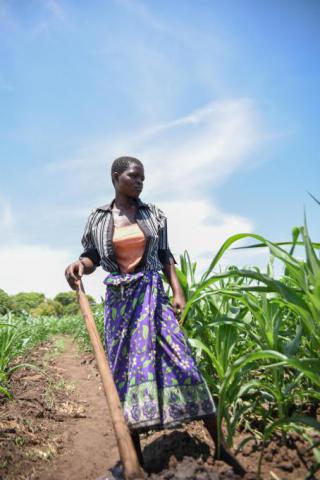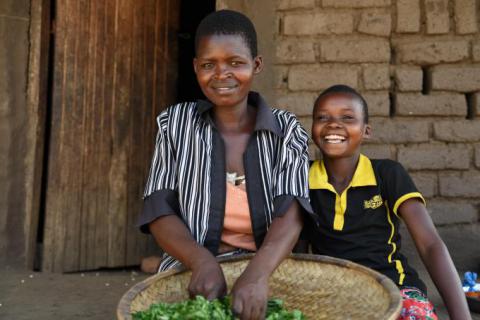From Resilience to Sustenance
Eluby Chabwera and her family’s normal routine of subsistence farming was temporarily halted when flooding affected their crops in early January 2015. Due to the heavy rains, almost all their crops were washed away, giving them the lowest yield they have ever encountered as a household. Eluby has two sons, Rafiki and Talandira, but she also looks after her sister’s daughter, Emily.
Fortunately, things picked up for them in early 2015 when they were found to be eligible for a Save the Children response towards the improved livelihood and resilience of vulnerable households affected by floods in Malawi. ECHO, the self-titled project, is funded by the European Commission's Humanitarian Aid and Civil Protection department (ECHO), running for a period of 9 months until March 2016 in Zomba, Phalombe and Mulanje district.
As a means to increase access to food, the project distributed assorted farm inputs to families as well as irrigation equipment including a treadle pump and watering cans. She was among 900 identified beneficiaries in her area of Traditional Authority (T/A) Mwambo who received a package of farm inputs containing a 10 kilogramme bag of top dressing fertilizer, 2 kilogrammes of maize seeds, 10 grams of tomato and mustard mayford seeds.
In late October, Eluby’s family started growing crops in their nursery, a nearby vegetable garden, and in an allocated space at a small-scale irrigation scheme that sits adjacent to their home. In fact, they were so determined to bounce back that as soon as they began yielding mustard seed leaves, they started selling them at a nearby market.
In December, we spent a day with Eluby and the family and caught up with them on what so happened to be their scheduled day for irrigating at the Namapata Irrigation Scheme. The community has an irrigation scheme schedule for each household in the area.

Photo Caption: Eluby stands, looking over her farm waiting for a treadle pump to start pouring water.
There she was, tending to a sea of glossy, green maize stalks standing at about 3 ½ ft. tall. She was determined to put most of her attention towards the maize considering they didn’t yield much in the previous harvest and because just like most families – its their staple food.
Her concentration paid off. By the start of the New Year, her maize had matured to a towering height of no less than 6 ft. However, in a sudden turn of events – Eluby recently had to sell off most of the maize because of external threats. In her community, there have recently been cases of theft. Thieves have been lurking around stealing people’s crops. The Namatapa Irrigation Scheme fell victim to these anonymous thefts.
When asked why this may be happening, Save the Children’s Humanitarian Affairs Manager, Steve Kamtimaleka stated that, “This is a clear indication of the prevalent hunger that a lot of people are facing in Malawi.” He went on to add that, “As a solution to the looming issue, we have been advising beneficiaries to sell their green maize and use the money realised to buy dry maize at ADMARC or local markets and also use the money for other household needs; in this way farmers will avoid coming out of the project empty handed.”
Eluby has been doing just that – anxiously selling her undried maize cobs to traders in order to secure income for her household. With the money she gets from the sold maize, Eluby plans to buy more seeds and inputs and plant again. Thanks to the project’s irrigation scheme she won’t be confined by the timely mercies of rainfed agriculture – she can step right outside of her home and get to planting as she sees fit.

Photo Caption: All smiles as Eluby and Emily sit on the porch preparing mustard leaves for lunch.
Although things may not have occurred as she had originally planned, Eluby and her family are completing their involvement with the ECHO project on a high-note. They are truly resilient – having bounced back from the devastating floods with a mindset of needing to rebuild and recover economically. They have set themselves in a place of security in regards to their improved livelihood.
As the project phases out and potentially targets other households, it will leave the area of Namatapa and Eluby’s family with confidence that it did not leave in vain. It will be leaving with assurance that it has imparted onto Eluby and individuals alike – with skills and tools that will continue to sustain them for years to come.
Written by Luzayo Nyirongo, Communications Coordinator
Edited by Sylvia Chikalipo, Agriculture and Disaster Risk Reduction Assistant
 Malawi
Malawi